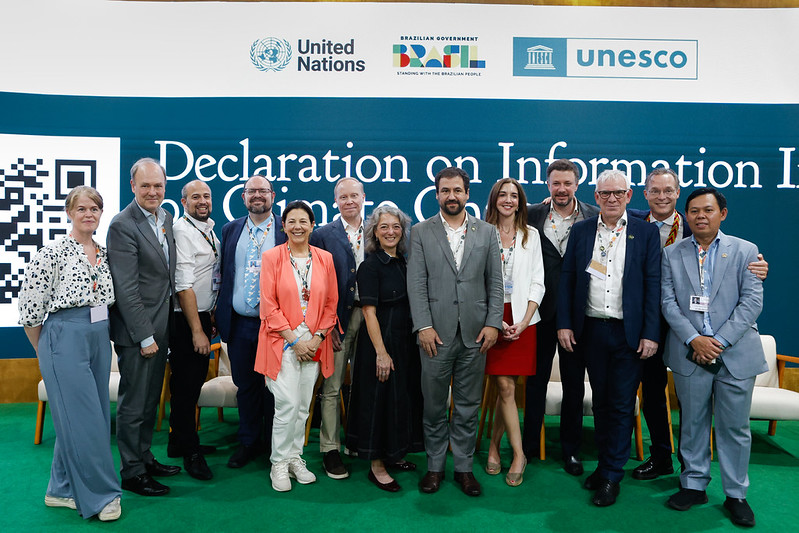On 12 November, a landmark Declaration on Information Integrity on Climate Change was adopted in Belém, Brazil setting for the first time information integrity and media freedom at the heart of climate change efforts.
The adoption of the Declaration follows the joint partnership between the Government of Brazil, the UN Secretaritat and UNESCO, establishing the Global Initiative on Information Integrity on Climate Change.
"We must fight mis- and disinformation, online harassment, and greenwashing," stated António Guterres, UN Secretary-General. "Scientists and researchers should never fear telling the truth," he added.
Audrey Azoulay, UNESCO’s Director-General commented that “Without access to reliable information about climate disruption we can never hope to overcome it. Through this initiative, we will support the journalists and researchers investigating climate issues, sometimes at great risk to themselves, and fight the climate-related disinformation running rampant on social media.”
“In the era of disinformation, obscurantists reject not only scientific evidence but also the progress of multilateralism. They control algorithms, sow hatred, and spread fear. They attack institutions, science, and universities. It is time to once again defeat the denialists,” commented President Luiz Inácio Lula da Silva.
The Declaration calls governments to secure funding and take legal measures on media freedom, media pluralism and the safety of environmental journalists, researchers and civil society.
Signatory parties so far include Belgium, Brazil, Canada, Chile, Denmark, Finland, France, Germany, Netherlands, Spain, Sweden and Uruguay.
Media Freedom and Environmental Journalists' and Researchers' Safety
The Declaration aims at mobilising governments, stakeholders in the private sector, civil society organisations, researchers and the academia, as well as funders.
Concrete action measures include fighting disinformation, misinformation, denialism and threats against environmental journalists and scientists.
The overall goal is to strengthen the public’s “trust in scientific knowledge as the foundation of urgent climate action by governments and citizens”.
Measures include committments on media freedom and pluralism - among others - such as to:
- Promote the integrity of information related to climate change at the international, national, and local levels, in line with international human rights law, including freedom of expression standards;
- Promote and support the sustainability of a diverse and resilient media ecosystem through adequate policies to enable and ensure accurate and reliable coverage, specially, within this context, on climate and environmental issues, as well as policies on advertising transparency and accountability;
- Create and implement policies and legal frameworks aligned with international human rights law that promote information integrity on climate change, and respect, protect and promote human rights, including the right to freedom of expression and access to information; and ensure the safety of environmental journalists, defenders, scientists, researchers and other public voices;
Background
The Global Initiative on Information Integrity on Climate Change had been announced at the G20 Leaders Summit in Rio de Janeiro in November 2024. It aims at boosting multilateral collaboration among States and international organizations to fund research and action promoting information integrity on climate issues.
Find the Declaration here








